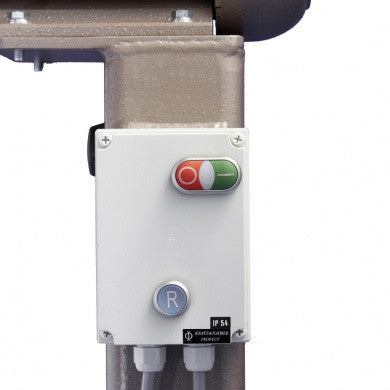Industrial Coffee Grinder: Cost, Quality, and Functionality Examined
Industrial Coffee Grinder: Cost, Quality, and Functionality Examined
Blog Article
Industrial Coffee Mill Overview: Increase Performance and Top Quality
In the affordable landscape of coffee production, choosing the right commercial coffee grinder plays a crucial function in improving both efficiency and item high quality. Recognizing the subtleties of various grinder kinds and vital attributes-- such as customizable grind settings and robust building-- can considerably influence the last flavor profile of the coffee.
Comprehending Grinder Types
When selecting a commercial coffee mill, understanding the numerous kinds readily available is critical for optimizing both taste extraction and operational effectiveness. Both primary types of mills are blade mills and burr mills. Blade mills utilize sharp blades that chop coffee beans right into irregular sizes, causing unequal removal and potentially unwanted flavors. While blade grinders are typically a lot more appropriate and budget-friendly for small operations, they are generally not suggested for industrial use.

Ultimately, choosing the appropriate kind of grinder is important to preserving quality and effectiveness in coffee manufacturing, making it essential for organizations to buy top notch burr grinders for optimum results.
Secret Attributes to Consider
Selecting a commercial coffee mill calls for cautious consideration of numerous key features that can dramatically affect both performance and the general coffee experience. One of the main aspects to assess is the grinding system. Burr mills are usually chosen over blade mills, as they supply a consistent grind size, which is essential for ideal extraction and taste.
Another important function is the grinder's ability. Depending upon the quantity of coffee you need to procedure, choose a version that can handle your demands without compromising rate or high quality. Additionally, consider the work settings supplied. A versatile grinder with numerous setups permits you to customize the grind size to various brewing approaches, boosting the coffee's taste profile.
The construction material likewise contributes in durability and upkeep. Stainless-steel parts frequently supply durability and are much easier to cleanse, which is necessary for maintaining hygiene criteria. Finally, review the mill's sound level, particularly in a busy café or production setting, where extreme noise can be turbulent. Purchasing a grinder that stabilizes these functions can considerably enhance both functional effectiveness and the top quality of the coffee offered.
Optimizing Grinding Refine
To achieve the ideal outcomes in coffee preparation, maximizing the grinding process is necessary. The grind size significantly influences removal, flavor, and total top quality of the brewed coffee. Different developing methods need certain grind dimensions; for circumstances, espresso demands a great work, while French press requires a rugged texture. Understanding the connection in between grind size and brewing method is the initial step in optimization.


Additionally, keeping an eye on the grinding rate can maximize the procedure. Slower grinding often produces much less warmth, preserving delicate flavors and fragrances. Alternatively, much faster grinding may generate too much warmth, adversely affecting the coffee's high quality.
Upkeep and Treatment Tips
Appropriate maintenance and care of commercial coffee grinders are vital for guaranteeing ideal efficiency and durability. Routine cleaning is the foundation of upkeep; deposit accumulation can affect taste and grinding performance. It is recommended to cleanse the grinder after each usage, wiping down the outside and removing any coffee premises from the burrs.
Furthermore, inspect the grinding burrs for deterioration. Boring burrs can endanger grind uniformity, so they should be replaced as needed. Industrial Coffee Grinder. Regularly calibrating the grinder is also crucial, as this preserves the desired grind size for different developing techniques
Lubrication of moving components ought to be done according to the manufacturer's specifications, as this lowers rubbing and extends the life of the tools. It is vital to use food-grade lubes to make sure safety and compliance with wellness regulations.
Lastly, keep the mill in a steady and dry environment to avoid corrosion and deterioration. By adhering to these maintenance and treatment suggestions, operators can improve the performance of their industrial coffee grinders while ensuring top quality result and extended functional life.
Return on Financial Investment Analysis
Evaluating the return on financial investment (ROI) for commercial coffee mills is critical for get more organizations seeking to optimize their coffee production capacities. A detailed ROI analysis aids identify the financial why not find out more practicality of spending in high-grade mills, allowing companies to consider the initial expenses against potential gains.
To perform a comprehensive ROI evaluation, organizations should take into consideration several essential variables. Assess the purchase price of the grinder, consisting of installation and any kind of necessary adjustments to existing framework. Next off, compute functional costs, including power consumption, upkeep expenditures, and labor performance improvements. High-performance grinders commonly bring about reduced grinding time and increased throughput, which can substantially enhance productivity.
Additionally, take into consideration the effect on product quality. Industrial Coffee Grinder. Superior mills yield a more constant grind dimension, which can boost flavor accounts and client satisfaction, inevitably driving sales. By increasing the high quality of the final item, companies can warrant higher rates, resulting in enhanced profits
Conclusion
In summary, a commercial coffee grinder plays a pivotal duty in improving both efficiency and product high quality within coffee manufacturing. Inevitably, the strategic investment in a dependable mill adds dramatically to improved profits and competitiveness in the coffee sector.
In the competitive landscape of coffee manufacturing, choosing the appropriate commercial coffee mill plays a pivotal duty in boosting both effectiveness and product high additional info quality. The 2 primary types of grinders are blade mills and burr grinders. Within the burr grinder classification, there are level burr mills and conelike burr mills, each with its advantages. Burr grinders are typically liked over blade grinders, as they supply a constant work dimension, which is important for optimal removal and flavor.
In summary, a commercial coffee mill plays a pivotal role in boosting both efficiency and product quality within coffee manufacturing.
Report this page